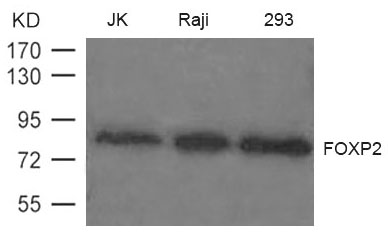
| WB | 咨询技术 | Human,Mouse,Rat |
| IF | 咨询技术 | Human,Mouse,Rat |
| IHC | 咨询技术 | Human,Mouse,Rat |
| ICC | 技术咨询 | Human,Mouse,Rat |
| FCM | 咨询技术 | Human,Mouse,Rat |
| Elisa | 咨询技术 | Human,Mouse,Rat |
| Aliases | SPCH1; CAGH44; TNRC10 |
| Entrez GeneID | 93986; |
| WB Predicted band size | 85kDa |
| Host/Isotype | Rabbit IgG |
| Antibody Type | Primary antibody |
| Storage | Store at 4°C short term. Aliquot and store at -20°C long term. Avoid freeze/thaw cycles. |
| Species Reactivity | Human,Mouse,Rat |
| Immunogen | Peptide sequence around aa.707~711(E-E-P-L-S) derived from Human FOXP2. |
| Formulation | Purified antibody in PBS with 0.05% sodium azide. |
+ +
以下是关于FOXP2抗体的3篇参考文献及其摘要内容:
1. **文献名称**:*FOXP2 in focus: what do genetic mutations tell us about this language-related gene?*
**作者**:Lai, C. S. L., Fisher, S. E., Hurst, J. A., et al.
**摘要**:该研究首次报道了FOXP2基因突变与家族性语言障碍的关联,并通过免疫组织化学实验(使用FOXP2特异性抗体)揭示了突变导致蛋白功能异常,影响基底神经节及皮层发育,为语言相关神经机制提供了分子证据。
2. **文献名称**:*Abnormal cerebellar development and axonal decussation due to mutations in FOXP2*
**作者**:Ferland, R. J., Cherry, T. J., Preware, P. O., et al.
**摘要**:研究利用FOXP2抗体进行小鼠脑组织染色,发现FOXP2蛋白在小脑浦肯野细胞高表达,且其缺失导致运动协调障碍及神经轴突交叉异常,提示FOXP2在运动-语言神经网络中的关键作用。
3. **文献名称**:*Molecular mechanisms of FOXP2 in rodent vocal communication*
**作者**:Vernes, S. C., Spiteri, E., Nicod, J., et al.
**摘要**:通过染色质免疫沉淀(ChIP)结合FOXP2抗体,该研究鉴定了FOXP2直接调控的靶基因(如CNTNAP2),并揭示其在鸣禽和小鼠发声学习中的保守调控通路,为语言进化研究提供实验依据。
4. **文献名称**:*Cross-species chromatin profiling highlights conserved and divergent roles of FOXP2 in vocal learning species*
**作者**:Spiteri, E., Konopka, G., Coppola, G., et al.
**摘要**:使用FOXP2抗体进行染色质分析,比较人类、小鼠及鸣禽脑中FOXP2结合位点,发现其在发声学习相关基因调控中的物种特异性差异,支持FOXP2在语言进化中的适应性功能。
这些文献均涉及FOXP2抗体的实验应用(如Western blot、免疫组化、ChIP-seq),聚焦于其在神经发育、语言障碍及跨物种比较研究中的分子机制。
The FOXP2 antibody is a crucial tool in neuroscience and molecular biology research, targeting the FOXP2 protein—a transcription factor encoded by the *FOXP2* gene. Discovered through studies of a family with inherited speech and language disorders, FOXP2 plays a vital role in neural development, particularly in brain regions involved in speech, motor coordination, and cognition. It regulates the expression of genes critical for synaptic plasticity, neurite outgrowth, and neural circuit formation.
FOXP2 antibodies are widely used in techniques like Western blotting (WB), immunohistochemistry (IHC), and immunofluorescence (IF) to detect FOXP2 expression in tissues, cell cultures, or animal models. These antibodies help researchers study protein localization, expression levels, and interactions, offering insights into neurodevelopmental processes and disorders. Specificity is ensured through controls like knockout validation or peptide blocking.
Dysregulation of FOXP2 is linked to speech-language impairments, autism spectrum disorders, and schizophrenia. FOXP2 antibodies aid in exploring these associations, as well as evolutionary studies comparing protein structure across species. Available as monoclonal or polyclonal variants, these antibodies are optimized for diverse applications, balancing sensitivity and specificity. Their utility extends to developmental biology, behavioral studies, and therapeutic research, underscoring FOXP2's importance in bridging genetic mechanisms and complex cognitive functions.
×